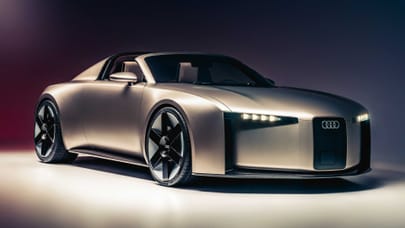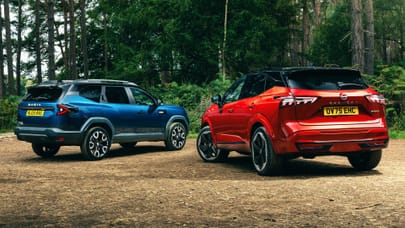
The big German carmakers are changing the way they build cars
Germany's car world is shifting into a 'software first' approach. But can it catch America?
Deep inside the German car companies, something very big indeed is shifting. Inside five years, they'll drastically reconfigure how they design, develop, build and sell.
I'd love to tell you what sort of cars this means we'll get. But it's too early to say. Anyway, it's possible they could be pretty well any sort. Except they won't have engines… But this revolution is about far more than just electric drive.
Last week BMW announced a new line-up from 2025, calling it die Neue Klasse. That's significant. The name was used for the generation of BMWs that began with the 1500 in 1962. Those sporty four-doors saved the company, and today's 5 Series traces a continuous shining thread straight back there. Sure enough BMW's boss Oliver Zipse says he wants this second Neue Klasse to be relevant beyond 2050.
He says it's "rethinking the car from the ground up. We are liberating ourselves from today’s architectures". Crucially, he says it'll have completely new software and IT.
Software is the new frontier. Or rather, a software-first approach, where the hardware is what follows. That's how Tesla and some of the Chinese – notably Nio – have been operating for some years.
Tesla got its early lead by coding software that made the most of the cells and motors and all other components: the car's top-to-bottom 'software stack'. The traditional car industry takes that stuff in different packages from different suppliers and stitches it together: powertrain controllers from one, chassis systems from another, infotainment from yet another.
Then Tesla continually updated its cars' efficiency and performance by using live data from every Tesla out there. The same, only more so, for Autopilot. Team Elon aims to capture your whole car life: vehicle, sales, services, comms, all the ecosystem. This is the kind of integration BMW wants. We seem to be beyond the bent-metal-first era. These are post-platform platforms.
The VW Group is thinking the same way. Audi has a hothouse team called Artemis. Its objective, says Audi chief Markus Duesmann, is matching Tesla's software in Audis and Bentleys on sale from 2024, by using entirely new onboard electronics and connectivity.
Question is, will Germany ever catch America? Berlin is a digital hothouse but isn't yet Silicon Valley
Porsche's development boss Michael Steiner says Porsche won't use 'classic metal platforms and proportions' of cheaper VW Group cars, but "it's about sharing software and intelligence".
Top Gear
Newsletter
Thank you for subscribing to our newsletter. Look out for your regular round-up of news, reviews and offers in your inbox.
Get all the latest news, reviews and exclusives, direct to your inbox.
In 2026 the VW brand will launch a new bunch of cars, simplified from Artemis. Project Trinity, it calls that.
Meanwhile Mercedes will have a bunch of cars codenamed MMA, again digital-first.
Strangely, this means the battery-driven platforms just now emerging – what's under the VW ID cars and BMW i4 – might soon be obsolescent. I dunno, maybe they can rip out their electronics and install new stuff later.
What does all this mean for the cars? Ultra-high bandwidth for infotainment. The live, high-res mapping that'll get them closer to self-driving. Better efficiency too: Mercedes talks about going half as far again per kWh as today's cars.
Also, far simpler manufacturing. Cars will be built with all the hardware, then you pay monthly fees to activate features. Upgraded UX? Fine-grained parking apps? High-end torque-vectoring? More power, but only in summer? Heated seats in winter? Better driver-assist just for the long holiday drive? Car sharing?
Question is, will Germany ever catch America? Berlin is a digital hothouse but isn't yet Silicon Valley. Germany's car engineers have parents who lived under the Stasi and grandparents who lived under the Nazis – both state systems that obsessively recorded the details of their citizens' lives. It's no surprise modern Germany remains culturally wary of big data. Unlike America.
Apple makes money from selling devices, then more afterward from the App Store and Music and Apple TV.
Car manufacturers fancy a piece of that action: getting you to pay now and pay later too. Does all this make cars sound boring? It shouldn't. If we don't want them in the first place, their manufacturers will be stuffed for good.








